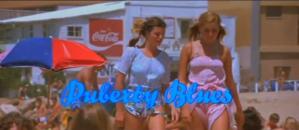 5392224246055011330.jpg
5392224246055011330.jpg
 5392224246055011330.jpg
5392224246055011330.jpg
Debbie and Sue are accepted into Greenhill Beach's gang, an elite group of teenagers occupying a particular stretch of Cronulla beachfront. As surfie groupies, Debbie and Sue find out that they are expected to submit to male whims and play out 'strange' rituals, such as not eating or going to the bathroom when a boy is around. The girls' life mainly consists of doing what everyone else does: watching the boys surf, having sex with them (in the back seat of cars and at home-alone parties), and getting drunk. The narrative maintains a humorously ironic distance from the awfulness of the scene, particularly through the use of narration. The boys, though portrayed as collectively dominant, are individually consigned to the margins, while Debbie and Sue ultimately break out of the confines of male-imposed rules.
This paper attempts a diffractive analysis that reads Bruce Beresford’s Australian populist film Puberty Blues (1981) through the more recent (2012) Channel 10 eight-part series television of the same title. The purpose of this experimental analysis is to notice ways both of these filmic artefacts re/enact gendered semblances performatively, co- creating binary gender relations through Baradian intra-actions with a virtual audience (in the perpetual present). This paper is not a historical account of the texts and/or a review of the substantial literature connected to either text or television/film production in Australia. It attempts to conduct a non-representational analysis as a reading through of the texts with each other. What is significant is the process of examining “how different differences get made, what gets excluded, and how those exclusions matter” (Karen Barad 2007, 30) during inter-action with filmic text and viewer. This manoeuvre posits that by re/turning events as iterative interactions visibility of materiality in the making may be rendered visible. By understanding intra-active processes educators may be able to frustrate delimiting accounts of girlhood as just the way it is and rather utilise these texts to open up other imaginaries of affirmative difference.
Source: Abstract
 Puberty Blues
Sydney
:
Currency Press
ScreenSound Australia
,
2004
Z1354318
2004
single work
criticism
Puberty Blues
Sydney
:
Currency Press
ScreenSound Australia
,
2004
Z1354318
2004
single work
criticism
'Bruce Beresford's Puberty Blues is a funny and poignant film that still speaks to the teenage audience as it honestly and sensitively deals with some of the central trials and temptations of growing up. The author recounts her experiences as the star of the film and what it was like filming the book by Kathy Lette and Gabrielle Carey.' (Source: Libraries Australia).
'Schofield recalls how she won the role of Debbie and what it was like on the set. She looks at the parallels between the film, the book and her own surfside teenage years, and at the extraordinary responses to the film, both on its release and since.' - Back cover